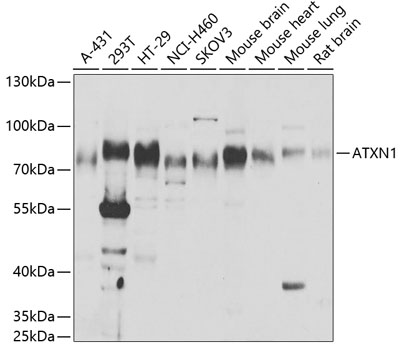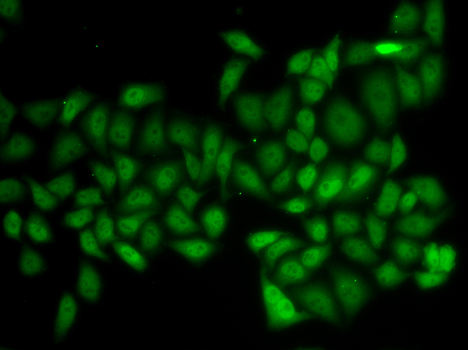Anti-ATXN1 Antibody (CAB6217)
- SKU:
- CAB6217
- Product type:
- Antibody
- Reactivity:
- Human
- Reactivity:
- Mouse
- Reactivity:
- Rat
- Host Species:
- Rabbit
- Isotype:
- IgG
- Antibody Type:
- Polyclonal Antibody
- Research Area:
- Epigenetics and Nuclear Signaling
Description
| 抗体名: | Anti-ATXN1 Antibody |
| 抗体コード: | CAB6217 |
| 抗体サイズ: | 20uL, 50uL, 100uL |
| 申し込み: | WB IF |
| 反応性: | Human, Mouse, Rat |
| 宿主種: | Rabbit |
| 免疫原: | Recombinant fusion protein containing a sequence corresponding to amino acids 586-815 of human ATXN1 (NP_001121636.1). |
| 申し込み: | WB IF |
| 推奨希釈: | WB 1:500 - 1:2000 IF 1:10 - 1:100 |
| 反応性: | Human, Mouse, Rat |
| ポジティブサンプル: | A-431, 293T, HT-29, NCI-H460, SKOV3, Mouse brain, Mouse heart, Mouse lung, Rat brain |
| 免疫原: | Recombinant fusion protein containing a sequence corresponding to amino acids 586-815 of human ATXN1 (NP_001121636.1). |
| 精製方法: | Affinity purification |
| ストレージバッファ: | Store at -20'C. Avoid freeze / thaw cycles. Buffer: PBS with 0.02% sodium azide, 50% glycerol, pH7.3. |
| アイソタイプ: | IgG |
| 順序: | ELKK VEDL KTED FIQS AEIS NDLK IDSS TVER IEDS HSPG VAVI QFAV GEHR AQVS VEVL VEYP FFVF GQGW SSCC PERT SQLF DLPC SKLS VGDV CISL TLKN LKNG SVKK GQPV DPAS VLLK HSKA DGLA GSRH RYAE QENG INQG SAQM LSEN GELK FPEK MGLP AAPF LTKI EPSK PAAT RKRR WSAP ESRK LEKS EDEP PLTL PKPS LIPQ EVKI CIEG RSNV GK |
| 遺伝子ID: | 6310 |
| Uniprot: | P54253 |
| セルラーロケーション: | Cytoplasm, Nucleus |
| 計算された分子量: | 86kDa |
| 観察された分子量: | 87kDa |
| 同義語: | ATXN1, ATX1, D6S504E, SCA1, ataxin-1 |
| バックグラウンド: | The autosomal dominant cerebellar ataxias (ADCA) are a heterogeneous group of neurodegenerative disorders characterized by progressive degeneration of the cerebellum, brain stem and spinal cord. Clinically, ADCA has been divided into three groups: ADCA types I-III. ADCAI is genetically heterogeneous, with five genetic loci, designated spinocerebellar ataxia (SCA) 1, 2, 3, 4 and 6, being assigned to five different chromosomes. ADCAII, which always presents with retinal degeneration (SCA7), and ADCAIII often referred to as the `pure' cerebellar syndrome (SCA5), are most likely homogeneous disorders. Several SCA genes have been cloned and shown to contain CAG repeats in their coding regions. ADCA is caused by the expansion of the CAG repeats, producing an elongated polyglutamine tract in the corresponding protein. The expanded repeats are variable in size and unstable, usually increasing in size when transmitted to successive generations. The function of the ataxins is not known. This locus has been mapped to chromosome 6, and it has been determined that the diseased allele contains 40-83 CAG repeats, compared to 6-39 in the normal allele, and is associated with spinocerebellar ataxia type 1 (SCA1). At least two transcript variants encoding the same protein have been found for this gene. |
| UniProt Protein Function: | ataxin-1: spinocerebellar ataxia type 1 (SCA1) protein. Expansion of CAG repeats in the SCA1 gene results in an abnormally long polyglutamine tract in the protein, causing polyglutamine-induced neurodegeneration. 14-3-3 and Akt kinase stabilize both wild-type and mutant forms of ataxin-1. The expansion of the polyglutamine tract may alter this function. |
| UniProt Protein Details: | Protein type:Nuclear export; RNA-binding Chromosomal Location of Human Ortholog: 6p23 Cellular Component: cytoplasm; intracellular membrane-bound organelle; nuclear inclusion body; nuclear matrix; nuclear RNA export factor complex; nucleoplasm; nucleus Molecular Function:chromatin binding; DNA binding; identical protein binding; poly(rG) binding; poly(U) binding; protein binding; protein C-terminus binding; protein self-association Biological Process: adult locomotory behavior; alveolus development; negative regulation of insulin-like growth factor receptor signaling pathway; negative regulation of phosphorylation; negative regulation of transcription from RNA polymerase II promoter; negative regulation of transcription, DNA-dependent; nuclear export; positive regulation of transcription from RNA polymerase II promoter; regulation of excitatory postsynaptic membrane potential; RNA processing; transcription, DNA-dependent; visual learning Disease: Spinocerebellar Ataxia 1 |
| NCBI Summary: | The autosomal dominant cerebellar ataxias (ADCA) are a heterogeneous group of neurodegenerative disorders characterized by progressive degeneration of the cerebellum, brain stem and spinal cord. Clinically, ADCA has been divided into three groups: ADCA types I-III. ADCAI is genetically heterogeneous, with five genetic loci, designated spinocerebellar ataxia (SCA) 1, 2, 3, 4 and 6, being assigned to five different chromosomes. ADCAII, which always presents with retinal degeneration (SCA7), and ADCAIII often referred to as the `pure' cerebellar syndrome (SCA5), are most likely homogeneous disorders. Several SCA genes have been cloned and shown to contain CAG repeats in their coding regions. ADCA is caused by the expansion of the CAG repeats, producing an elongated polyglutamine tract in the corresponding protein. The expanded repeats are variable in size and unstable, usually increasing in size when transmitted to successive generations. The function of the ataxins is not known. This locus has been mapped to chromosome 6, and it has been determined that the diseased allele contains 41-81 CAG repeats, compared to 6-39 in the normal allele, and is associated with spinocerebellar ataxia type 1 (SCA1). At least two transcript variants encoding the same protein have been found for this gene. [provided by RefSeq, Jan 2010] |
| UniProt Code: | P54253 |
| NCBI GenInfo Identifier: | 206729854 |
| NCBI Gene ID: | 6310 |
| NCBI Accession: | P54253.2 |
| UniProt Secondary Accession: | P54253,Q17S02, Q9UJG2, Q9Y4J1, |
| UniProt Related Accession: | P54253 |
| Molecular Weight: | 86,923 Da |
| NCBI Full Name: | Ataxin-1 |
| NCBI Synonym Full Names: | ataxin 1 |
| NCBI Official Symbol: | ATXN1 |
| NCBI Official Synonym Symbols: | ATX1; SCA1; D6S504E |
| NCBI Protein Information: | ataxin-1 |
| UniProt Protein Name: | Ataxin-1 |
| UniProt Synonym Protein Names: | Spinocerebellar ataxia type 1 protein |
| Protein Family: | Ataxin |
| UniProt Gene Name: | ATXN1 |
| UniProt Entry Name: | ATX1_HUMAN |



